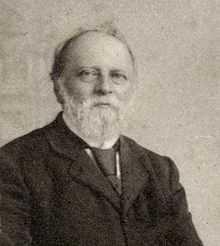Samuel van Houten

Van Houten was born in Groningen. He studied law at the University of Groningen, obtaining a degree in 1859. He then worked as a lawyer.
In 1869, van Houten was first elected to the Second Chamber or lower house of the Dutch parliament for the electoral district Groningen, until he became a minister in 1894 in the cabinet of Joan Röell.
Van Houten introduced a law in 1874, Kinderwetje - van Houten (Child Labour Act), that forbade children younger than 12-year old to work as labourers in factories. It was the first social law of the Netherlands. Nonetheless, van Houten who started out as very progressive gradually became more conservative and opposed further social laws and any egalitarianism by the state. On individual issues, he continued to sponsor progressive causes, writing about feminism, prostitution and birth control. He was president of a Neo-Malthusian society in 1888.
Van Houten was the founder of the short-lived Liberal Party.
| Political offices | ||
|---|---|---|
| Preceded by J. P. R. Tak van Poortvliet |
Dutch Minister of Internal Affairs 1894-1897 |
Succeeded by Hendrik Goeman Borgesius |
| |||||||||||
|
